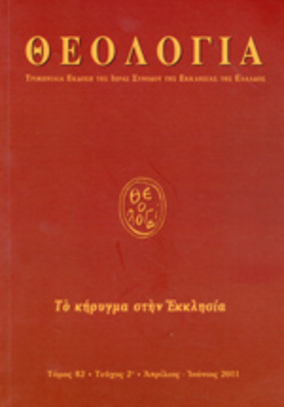Η εκπόρευσις του Αγίου Πνεύματος κατά τον ιερόν Φώτιον
Part of : Θεολογία : τριμηνιαία έκδοση της Ιεράς Συνόδου της Εκκλησίας της Ελλάδος ; Vol.50, No.1, 1979, pages 47-70
Issue:
Pages:
47-70
Author:
Abstract:
The Procession of the Holy Spirit according to St. Photius. Photius considers the issue of the Procession of the Holy Spirit as a theological question of cardinal importance and insists that the Holy Spirit proceeds from the Father alone, as suggested by Christ Himself in John 15,24. On the contrary, the Procession of the Holy Spirit from the Father and the Son is not supported by the Biblical evidence. John 16, 14 by no means implies that the Holy Spirit receives His hyparxis from the Son. The term «receiving» does not refer to the causal derivation of the Holy Spirit's Being but rather to the proclamation of things to come. Galatians 4,6 suggests that the Holy Spirit is consubstantial with the Son. The Holy Spirit is also called «Spirit of Christ» simply because the Spirit anoints Christ according to the latter's human nature. The idea of Filioque is in disagreement with the teaching of the Fathers and also with the official pronouncement of the Church, i.e. the Creed and the Documents of the Councils. It is also in opposition to the fundamentals of the Faith. As Photius explains, because the Father, as Father, begets the Son and proceeds the Holy Spirit, the sharing of the Son in the Procession of the Holy Spirit would imply that the Son shares the hypostasis of the Father or stands for it, or that He is a part of Father's hypostasis. Such a notion, however, transforms the Holy Triad into a dyad. The two divine hypostases are thus confused, forming a single Person : a teaching conforming to the views of Salbellius, or rather, in the words of Photius, of «some other half-Sabellian monster». If the Father proceeds the Holy Spirit not on the basis of His Hypostasis but on the basis of the divine nature, then not only the Son will participate in the procession of the Holy Spirit, but the Holy Spirit Himself will also take part in His own mode of existence because of the common divine nature. The idea that the Son together with the Father is a cause of the mode of Being of the Holy Spirit introduces into the Holy Trinity two causes and two principles. This of course cannot be reconciled with the divine Monarchia of the Father, according to which the Father is the unique cause of being of both the Son and the Holy Spirit, who are «caused» (αιτιατά). If the Son as a cause alone or with the Father proceeds the Holy Spirit, then the Father's procession of the Holy Spirit must be imperfect. This, however, is in contradiction with the Father's attribute as being perfect. On the other hand, if to the perfect cause, i.e. the Father, we add another one, i.e the Son, this cause must be imperfect and inferior. This notion, though, is blasphemous. The Filioque, Photius goes on, must be rejected for another reason, namely, that it re-introduces certain heresies, such as Gnosticism, Macedonianism, Sabellianism and even the erroneous conception that the Spirit is the Grandson of the Father. Photius admits that there is only one sense according to which the Holy Spirit proceeds from the Son, namely, not in His mode of Being, but in His temporal mission to the world.
Subject:
Subject (LC):




